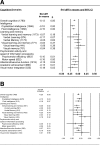Cognitive function in children with type 1 diabetes: a meta-analysis
- PMID: 18753668
- PMCID: PMC2518367
- DOI: 10.2337/dc07-2132
Cognitive function in children with type 1 diabetes: a meta-analysis
Abstract
Objective: To quantify the magnitude and pattern of cognitive difficulties in pediatric type 1 diabetes as well as the effects associated with earlier disease onset and severe hypoglycemia.
Research design and methods: Pediatric studies of cognitive function since 1985 were identified for study inclusion using MEDLINE and PsycInfo. Effect size (ES, Cohen's d) between the diabetic and control groups, expressed in SD units, were calculated within cognitive domains to standardize meta-analysis test performance.
Results: The meta-analysis sample of 2,144 children consisted of 1,393 study subjects with type 1 diabetes and 751 control subjects from 19 studies. Overall, type 1 diabetes was associated with slightly lower overall cognition (ES -0.13), with small differences compared with control subjects across a broad range of domains, excluding learning and memory, which were similar for both groups. Learning and memory skills, both verbal and visual (-0.28 and -0.25), were more affected for children with early-onset diabetes (EOD) than late-onset diabetes (LOD), along with attention/executive function skills (-0.27). Compared with nondiabetic control subjects, EOD effects were larger, up to one-half SD lower, particularly for learning and memory (-0.49). Generally, seizures were associated with a negligible overall cognition ES of -0.06, with slight and inconsistent cognitive effects found on some measures, possibly reflecting the opposing effects of poorer versus better metabolic control.
Conclusions: Pediatric diabetes generally relates to mildly lower cognitive scores across most cognitive domains. Cognitive effects are most pronounced and pervasive for EOD, with moderately lower performance compared with control subjects. Seizures are generally related to nominal, inconsistent performance differences.
Figures

References
-
- Holmes CS, Fox MA, Cant MC, Lampert NL, Greer T: Disease and demographic risk factors for disrupted cognitive functioning in children with insulin-dependent diabetes mellitus (IDDM). School Psych Review 28:215–227, 1999
-
- Desrocher M, Rovet J: Neurocognitive correlates of type 1 diabetes mellitus in childhood. Child Neuropsychol 10:36–52, 2004 - PubMed
-
- Ryan CM, Vega A, Drash A: Cognitive deficits in adolescents who developed diabetes early in life. Pediatrics 75:921–927, 1985 - PubMed
-
- Holmes CS, Richman LC: Cognitive profiles of children with insulin-dependent diabetes. Dev Behav Pediatr 6:323–326, 1985 - PubMed
-
- Rovet J, Ehrlich R, Hoppe M: Specific intellectual deficits in children with early onset diabetes mellitus. Child Dev 59:226–234, 1988 - PubMed
Publication types
MeSH terms
Grants and funding
LinkOut - more resources
Full Text Sources
Medical

